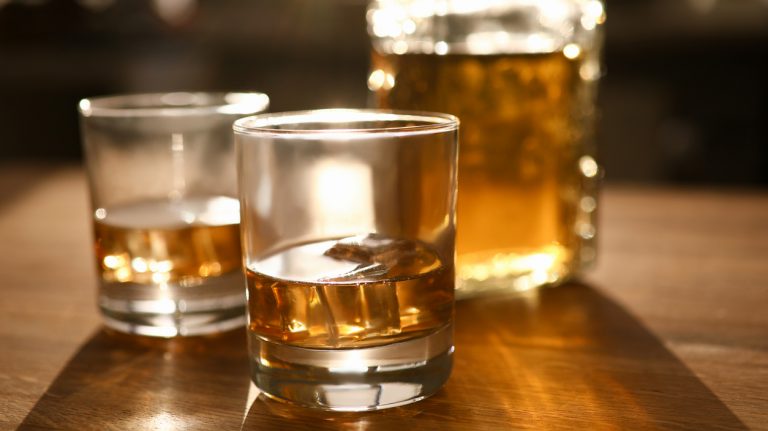
Jim Beam, Jack Daniel’s, Elijah Craig, George T. Stagg. When you think of whiskies named after people, do any women come to mind? Probably not—there are very few examples. In 2012, Glenfiddich released Janet Sheed Roberts Reserve, a 55 year old single malt named for the granddaughter of company founder William Grant, but—provocative marketing aside—that’s about it as far as women’s representation on whisky labels goes.
That’s about to change, however, as Johnnie Walker has announced the Jane Walker Edition of its Black Label blended scotch. The limited release, rolling out in March to coincide with Women’s History Month, is described by parent company Diageo as a step forward in progress, the logical move for a brand whose icon is a striding figure. Up to now, that figure has been male, but bottles of the Jane Walker Edition will feature a striding woman with the same recognizable tailcoat, top hat, and cane. A dollar from every bottle sale (up to $250,000) will be donated to the non-profits Monumental Women, which is pushing to erect a monument honoring women suffragists in New York City’s Central Park, and She Should Run, which encourages women to run for public office.
Cynics will likely decry this move as just another way Diageo is trying to capitalize on the sincere and necessary #TimesUp movement which has captured the public’s attention in recent months—though the planning and preparation that goes into a special edition like this probably began long before the Harvey Weinstein scandal erupted. That said, there was never a “Jane Walker” as there was an actual historical person named John Walker, and the decision to fabricate a female figure, rather than to honor a woman who existed and contributed to the whisky, feels contrived.
The history of women in the whisky industry is well documented by Fred Minnick in his book, “Whiskey Women: The Untold Story of How Women Saved Bourbon, Scotch, and Irish Whiskey.” Women have participated in the whisky world for centuries as distillers, blenders, owners, marketers, and much more, but their contributions have often been forgotten, overlooked, or outright ignored. Only in recent years have women like Rachel Barrie (formerly of Glenmorangie and Ardbeg; then Morrison Bowmore Distillers; now at GlenDronach, BenRiach, and Glenglassaugh), Elizabeth McCall (Woodford Reserve), Allisa Henley (formerly of George Dickel, now working on Sazerac’s as-yet-unnamed Tennessee whiskey), Kirstie McCallum (Deanston, Bunnahabhain, and Tobermory), Marianne Barnes (formerly of Woodford Reserve, now helming Castle & Key Distillery), Pamela Heilmann (formerly of Jim Beam, now at Michter’s), Nancy Fraley (aka “The Nose,” consultant to dozens of craft whiskey distilleries), and many others been celebrated as masters of their craft.
Diageo missed a huge opportunity here, despite it being right in front of their noses. The press release describes two women who played roles in the history of Johnnie Walker: Elizabeth Walker, the wife of John Walker, who helped create the original blended whisky in the family’s grocery store; and Elizabeth Cumming, who sold Cardhu Distillery—which makes the “heart malt” for Johnnie Walker—to John Walker & Sons in 1893. Rather than a fictional Jane Walker, why not name the whisky for one of these real women, whose contributions surely merit more than a token mention in the press release?
Here’s another idea: the press release also states that “nearly 50 percent of the brand’s 12 expert blenders are women.” Wouldn’t it be a more substantial and progressive step forward to create a whisky named for one of these women, who actively contribute to the Johnnie Walker brand today? How about introducing these blenders to the whisky drinking public as representatives of the brand?
Diageo has a well-earned reputation for inclusivity and promoting gender equality in the workplace; it has a high number of women in executive and board roles, and it was ranked in Bloomberg’s gender equality index last year. The company doesn’t have to make up a fictional woman to prove that it’s committed to equal representation of women in whisky. Instead, it could take a pioneering step to celebrate the contributions of an actual woman who is creating whisky by naming a whisky for her. Some distillery will do it eventually—but Diageo could and should take the first step.





